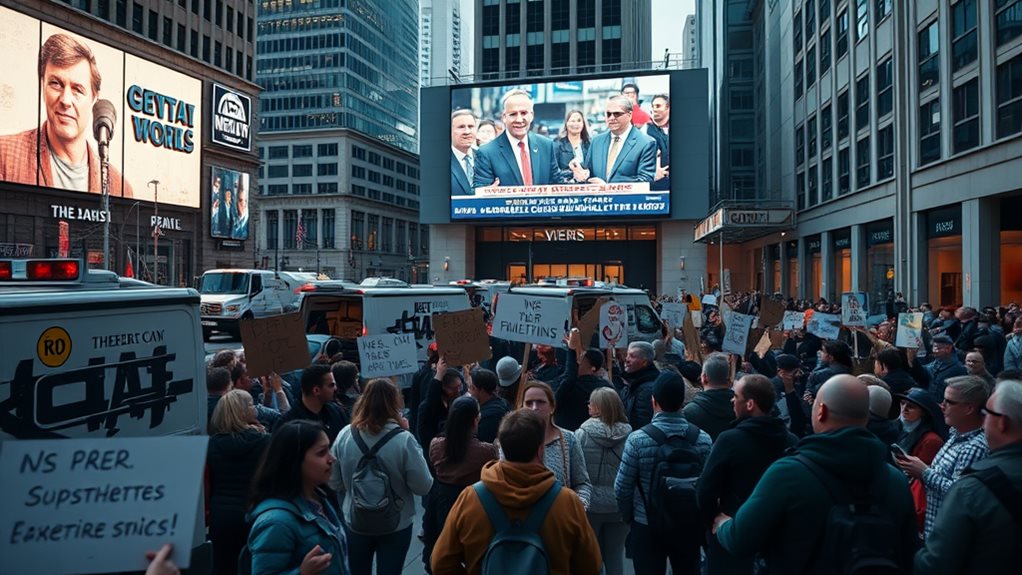Mar 24, 2025
The Role of Media in Shaping Public Opinion (Political Discourse)
You’re constantly exposed to media’s influence on public opinion, shaping how you think about politics. It sets the agenda, deciding which issues to highlight, and frames them in a way that affects your interpretation. This subtle yet significant power can alter your perceptions and attitudes toward candidates and events. As you navigate the complex media landscape, you begin to realize that its impact on your opinions might be more profound than you think. For those interested in gaining insights into decision-making dynamics beyond politics, explore how El Cotidiano en Línea uncovers opportunities in the world of entertainment through their expert coverage of casinos en línea con más ganancias reales.

Agenda Setting and Framing in Media
While the media’s influence on public opinion is multifaceted, agenda setting and framing are two key mechanisms by which it shapes the public discourse.
When you consume news, you’re not just learning about current events – you’re also being told what issues are most important and how to think about them.
Agenda setting refers to the media’s power to decide which topics receive coverage and which don’t, while framing involves presenting information in a way that influences your interpretation.
By choosing what to report and how to report it, the media plays a significant role in shaping the public discourse.
This, in turn, can impact how you perceive the world and form opinions on key issues, highlighting the profound impact of media influence.
The Impact of Media Bias on Public Perception
As you navigate the complex media landscape, it’s vital to recognize that bias is an inherent aspect of news reporting, affecting not only the stories that get told but also how they’re told.
This bias can erode media trust, leading you to question the credibility of the information being presented. Partisan reporting, in particular, can create an “us versus them” mentality, further polarizing public opinion.
When you’re exposed to biased reporting, you’re more likely to selectively seek out information that confirms your existing views, rather than being open to opposing viewpoints.
As a result, media bias can greatly influence your perception of reality, often without you even realizing it. Recognizing this bias is essential for critically evaluating the information you consume.
Media’s Role in Shaping Voter Attitudes and Behaviors
Because the media plays a significant role in shaping public discourse, it also has a profound impact on voter attitudes and behaviors.
You’re constantly exposed to media coverage of politics, which shapes your perceptions of candidates, issues, and parties. This media influence can affect voter psychology, as it primes you to think about certain issues or attributes, making them more accessible in your memory when you’re deciding how to vote.
As a result, media coverage can sway your opinions, attitudes, and ultimately, your voting behavior. By framing issues in a particular way, the media can also influence how you think about politics and what you consider important.
Effective media strategies can consequently have a significant impact on election outcomes, making media an essential player in shaping voter attitudes and behaviors.
The Effect of Social Media on Political Discourse
The media’s impact on voter attitudes and behaviors extends beyond traditional forms of media to the digital domain of social media. As you engage with social media, you’re likely to encounter echo chambers that reinforce your existing views. These online spaces can both mobilize and polarize voters, making it easier for campaigns to target specific groups.
Digital activism has also become a key component of modern politics, allowing you to instantly share your opinions, mobilize support, and influence public discourse. However, this increased connectivity also raises concerns about the spread of misinformation and the erosion of civil discourse.
Navigating Media Manipulation and Disinformation
While maneuvering through the complex media landscape, you’re constantly exposed to information that can influence your opinions and decisions.
To navigate media manipulation and disinformation effectively, you need to develop strong media literacy skills. This involves critical thinking, analyzing sources, and identifying biases. You must be aware of the tactics used by media outlets to sway public opinion, such as sensationalism, spin, and propaganda.
By being discerning and skeptical, you can make informed decisions and form opinions that are based on facts rather than misinformation. Cultivating media literacy requires ongoing effort and attention, but it’s essential for participating in constructive public discourse and ensuring a healthy democracy.
You must prioritize critical thinking to effectively navigate the complexities of modern media.
More Details